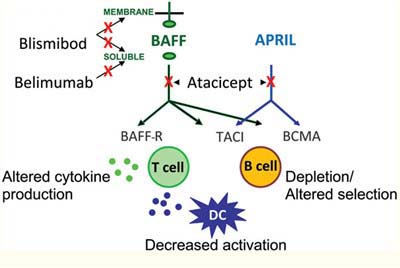Date: 2022-05-23
hits: 473
BAFF is a member of the tumor necrosis factor (TNF) family, involved in stimulating the function of B and T cells, and is an important factor for the survival and maturation of peripheral B cells. BAFF was first discovered in 1999 as a cytokine mainly produced by dendritic cells, macrophages, and lymphocytes, and functions by binding to its receptors (BAFF-R, TACI, and BCMA). The main function of BAFF is to promote the generation, maturation, and survival of B lymphocytes, as well as the production of antibodies. Research has shown that BAFF plays a crucial role in the immune system. It is involved in regulating the development and differentiation process of B lymphocytes, promoting the generation and maturation of B cells in bone marrow and peripheral tissues. At the same time, BAFF can also promote the proliferation of B cells and inhibit their apoptosis, thereby maintaining the survival of B cells. In addition to its role in the normal immune system, the abnormal expression of BAFF is also closely related to the occurrence and development of various immune related diseases. For example, excessive BAFF expression is associated with the occurrence of autoimmune diseases such as rheumatoid arthritis, systemic lupus erythematosus, and Sjogren's syndrome, lymphoma, and other tumors.
Although recombinant human BAFF has shown great potential in the medical field, there are still many challenges and areas that require further research. This includes in-depth exploration of BAFF signaling mechanisms, studying its interactions with other cytokines, and evaluating its efficacy and safety in the treatment of different diseases. In addition, further improving the preparation methods and purification techniques of recombinant proteins is also a current research hotspot.






